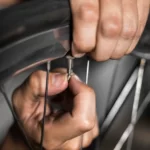Reviving Body and Mind After Intense and Long Rides - Your Guide to Cycling Recovery
Cycling is a fantastic way to stay fit while also exploring the world around you. Your passion for conquering miles on two wheels knows no bounds. Whether it’s a heart-pounding mountain trail or a demanding road race, pushing your limits on the bicycle is exhilarating. However, recovering after such challenging rides is just as important as the ride itself. Recovery is important for muscle repair, energy restoration, and overall health. Even so, understanding how to recover efficiently after such rides is vital to ensuring you can continue to enjoy cycling while keeping your body in peak condition. In this article, we’ll discuss key strategies for recovering after intense and long rides, including essential tips, nutrition, and more.
Recovering After a Long Ride: Why It Matters
Before delving into specific recovery strategies, let’s underline why post-ride recovery is crucial. When you push your body during a long and intense cycling session, you subject your muscles, joints, and cardiovascular system to substantial stress. Proper recovery helps your body adapt and come back even stronger. Neglecting recovery can lead to overtraining, injuries, and burnout. So, it’s essential to pay attention to your body’s needs after every big ride.
Cycling Recovery Tips
- Cool Down: Allow yourself a few minutes for a proper cooldown after a challenging ride. Gradually reduce your pace to lower your heart rate and prevent blood from pooling in your legs. As you approach the final stretch of your journey, maintain a slower, more relaxed riding pace. This approach will ensure a smoother transition and help your body recover effectively.
- Stretch it Out: Gentle stretching improves blood circulation, reduces muscle soreness, and increases flexibility. Devote time to stretching major muscle groups such as quads, hamstrings, and calves. Incorporating yoga or Pilates into your recovery routine can also help in restoring balance and muscle flexibility.
- Hydration is Key: After an intense workout, dehydration can hinder the body’s recovery process. Drink plenty of water and consider incorporating electrolyte-rich drinks to restore essential minerals lost through sweat.
- 4. Respect the Recovery Period: Just as a well-earned rest day is crucial for training, allowing your body time to recover after an intense and long ride is equally essential. Strive for at least one day of rest before jumping back into your regular routine. Use this time to pamper yourself with effective recovery techniques.
- Active Recovery Rides: Adding low-intensity rides the day after a heavy bike workout can do miracles. These easy rides aid in the removal of toxins, the relief of muscle soreness, the preservation of flexibility, and the promotion of increased blood circulation to your tired muscles. The short, simple rides are designed to keep your legs moving without exhausting them. They effectively minimize muscle stiffness and serve an important role in accelerating your healing.
- Invest in Massage and Self-Care: Treat yourself to a soothing massage or use foam rollers to target muscles that need extra attention. It’s a great way to relax and promote recovery. These techniques enhance blood circulation, relieve tension, and accelerate the recovery process. Additionally, indulge in Epsom salt baths that facilitate muscle relaxation and alleviate soreness.
- Ice Baths and Contrast Showers: Cold therapy can reduce inflammation and muscle soreness. Consider an ice bath or contrast showers, alternating between hot and cold water for improved circulation.
- Rest and Sleep: Never underestimate the power of quality sleep to restore both your body and mind. Ensure you get a good night’s sleep of at least 7-8 hours to allow your body to repair and rejuvenate, hormone regulation, and enhanced mental clarity. Sleep is when the body releases growth hormones and repairs damaged tissues. A well-rested cyclist is a recovered cyclist.
- Nutrition Powerhouse: Fuel up with cycling recovery food that aids in muscle repair and replenishes depleted energy stores.Consume a balanced meal with lean protein, complex carbohydrates, and healthy fats. Protein aids in muscle repair, while carbs replenish glycogen stores. such as whole grains and fruits, to refuel muscles and replenish glycogen stores.
Nutritional Recovery After a Tough Ride
Proper nutrition plays a significant role in your recovery process. Your body requires specific nutrients to repair muscles, replenish energy stores, and reduce inflammation. Here are some essential post-ride nutrition tips:
Protein: Protein is crucial for muscle recovery. Include sources of lean protein like chicken, fish, beans, and tofu in your post-ride meal.
Carbohydrates: Replenish glycogen stores with carbohydrates. Opt for complex carbs like whole grains, fruits, and vegetables.
Antioxidants: Foods rich in antioxidants can help reduce inflammation. Berries, leafy greens, and nuts are excellent choices.
Fats: Include healthy fats from sources like avocados, olive oil, and nuts. They support various bodily functions, including joint health.
Hydration: Continue to drink water throughout the day to stay hydrated. Coconut water or electrolyte drinks can help replace lost minerals.
Supplements: Some cyclists find benefit from supplements like branched-chain amino acids (BCAAs) or tart cherry juice, known for their potential to reduce muscle soreness.
Sample Meal Ideas for Cycling Recovery
Here are a few post-ride meal ideas to kickstart your recovery:
1-Protein-Packed Smoothie
Ingredients:
- Greek yogurt or a plant-based yogurt for a dairy-free option
- Whey protein or a vegan protein powder
- Frozen mixed berries
- Banana
- Spinach
- milk or water
Instructions:
Blend all the ingredients until smooth. This smoothie is rich in protein, antioxidants, and vitamins.
2- Grilled Chicken Quinoa or Rice Bowl
Ingredients:
- Grilled chicken breast or a plant-based protein source
- Cooked rice or quinoa
- Steamed broccoli
- Sliced avocado
- Sautéed bell peppers and onions
- Drizzle of olive oil and balsamic vinegar
Instructions:
Assemble the ingredients in a bowl for a balanced meal high in protein, fiber, and healthy fats.
3- Salmon and Sweet Potato
Ingredients:
- Baked or grilled salmon fillet
- Roasted sweet potato with a drizzle of olive oil
- Steamed asparagus
- Lemon wedges for extra flavor
Instructions:
This meal provides a healthy dose of omega-3 fatty acids, complex carbs, and essential nutrients.
4- Veggie Stir-Fry with Tofu
Ingredients:
- Tofu for a plant-based protein
- Mixed stir-fry vegetables (bell peppers, broccoli, carrots, snap peas)
- Low-sodium soy sauce or a teriyaki sauce
- Brown rice or quinoa
Instructions:
Sauté tofu and vegetables in a stir-fry sauce, and serve over brown rice or quinoa for a nutritious and protein-rich meal.
5-Whole-Grain Pasta with Pesto
Ingredients:
- Whole-grain pasta (e.g., whole wheat or chickpea pasta)
- Fresh basil pesto (homemade or store-bought)
- Cherry tomatoes
- Grated Parmesan cheese or a dairy-free alternative
Instructions:
Toss cooked pasta with pesto, cherry tomatoes, and a sprinkle of cheese for a satisfying and carb-rich recovery meal.
6- Oatmeal with Berries and Nuts
Ingredients:
- Rolled oats
- Fresh berries (strawberries, blueberries)
- Chopped nuts (almonds, walnuts)
- Honey or maple syrup for sweetness
Instructions:
Cook oats and top with berries, nuts, and a drizzle of honey or syrup. This meal is an excellent choice for a quick and easy recovery breakfast.
In conclusion, recovering after intense and long rides is essential for your well-being and continued cycling enjoyment. Incorporate these recovery strategies, pay attention to your nutrition, and remember that everyone’s recovery needs are unique. Listen to your body, and you’ll be back in the saddle for your next cycling adventure in no time.






